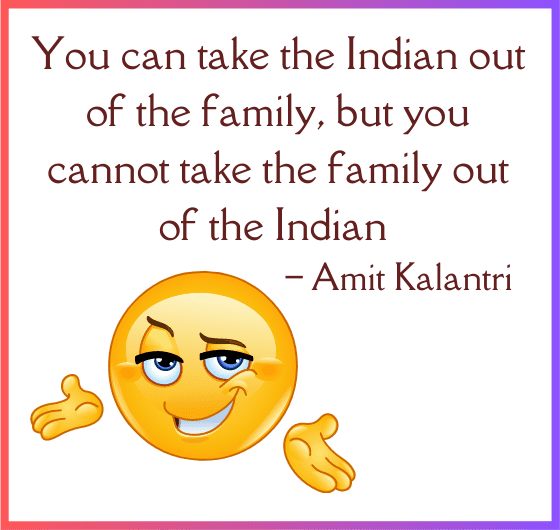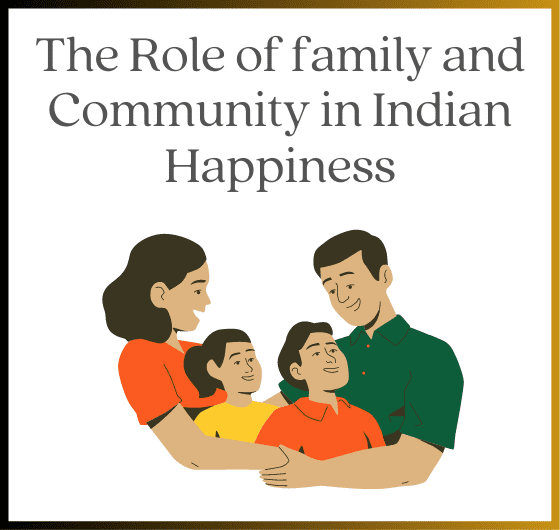Family and community play a vital role in fostering happiness and well-being in Indian culture. The strongest bonds of kinship and communal support are deeply ingrained in the fabric of Indian society, providing a foundation for happiness and resilience. This communal support spices up Indian Happiness.
The value placed on close relationships and social connections in Indian culture creates a sense of belonging and purpose, which are essential components of happiness.
In India, happiness is often seen as a collective endeavor, with the well-being of the family and the community being just as important as individual happiness.
Ultimately, the role of family and community in Indian happiness reflects a broader cultural emphasis on interconnectedness and interdependence, which can provide a powerful source of meaning and fulfillment.
A connection is the feeling you get when you’re with someone. It’s not just a physical connection, but an emotional one.

Indian family values and happiness
Alone, you are strong, but together, you’ll be stronger than ever.
In India, family values are deeply ingrained in the culture, with the family unit being viewed as the cornerstone of society. Indian families are typically close-knit and multigenerational, with strong bonds between parents, children, and grandparents. These close relationships are often seen as essential for fostering happiness and well-being and are deeply valued and celebrated in Indian culture.
Joint families, shared traditions, and communal celebrations all contribute to a powerful sense of unity and togetherness, which are essential for Indian happiness.
Those who respect the elderly pave their own road toward success.
One of the key components of Indian family values is respect for elders. In Indian families, older family members are often held in high esteem, and their wisdom and life experience are valued and honored. This respect for elders helps to create a sense of stability and continuity within the family, which can provide a foundation for happiness and fulfillment.
An elderly person at home [is like] a living golden treasure
Another important aspect of Indian family values is the emphasis on joint families. In India, it is common for multiple generations to live under the same roof, with grandparents, parents, and children all sharing living space and contributing to the household.
This arrangement helps to foster a sense of community and togetherness, as well as providing emotional and practical support for all members of the family.
Develop a passion for learning. If you do, you will never cease to grow.

Indian families also place a strong emphasis on education and achievement. Parents are typically highly invested in their children’s success and work hard to provide them with the best opportunities and resources. This emphasis on education and achievement can help to promote a sense of purpose and meaning within the family, as well as provide a sense of accomplishment and pride.
An investment in knowledge pays the best interest. – Benjamin Franklin
In addition to these values, Indian families also place a strong emphasis on traditions and cultural practices. Families often celebrate important festivals and events together, and pass down cultural knowledge and customs from generation to generation.
This helps to create a sense of continuity and connectedness within the family, as well as providing a source of joy and celebration.
Overall, Indian family values play an important role in promoting happiness and well-being. By fostering close relationships, respect for elders, a sense of community, and a focus on education and achievement, Indian families provide a powerful source of support and meaning for their members.
Moreover, by valuing and celebrating these family values, Indian culture has created a rich and vibrant tradition of happiness and fulfillment.
Importance of community in Indian culture
India has two million Gods, and worships them all. In religion all other countries are paupers; India is the only millionaire” – Mark Twain
In Indian culture, community is a central pillar that helps to foster a sense of belonging, support, and connectedness among individuals. The importance of community in Indian culture cannot be overstated, as it is deeply ingrained in the fabric of society and has a profound impact on the well-being and happiness of all its members with a perfect bond of togetherness.
There is a proper dignity and proportion to be observed in the performance of every act of life.
At the heart of Indian communities lies a sense of togetherness and solidarity that transcends individual differences and promotes a shared sense of purpose and identity.

Indian culture connects every soul secretly. This shared identity is often based on a common language, religion, or cultural tradition, and helps to create a sense of unity and belonging among community members.
“You can take the Indian out of the family, but you cannot take the family out of the Indian.” – Amit Kalantri
The importance of community in Indian culture is reflected in the many festivals and celebrations that are held throughout the year. These events provide an opportunity for individuals to come together, share food, music, and stories, and strengthen their bonds of friendship and togetherness.
In addition to providing a sense of belonging and togetherness, the community in Indian culture also plays a vital role in providing support and assistance to its members. Whether it is through financial assistance, emotional support, or practical help, community members are always ready to lend a helping hand to those in need.
The greatness of a community is most accurately measured by the compassionate actions of its members.
The importance of community in Indian culture is also evident in the way that it helps to promote social cohesion and harmony. By bringing together individuals from different backgrounds and walks of life, the community helps to break down barriers and promote understanding and empathy among diverse groups. This is the beauty of Indian culture
In conclusion, the importance of community in Indian culture is a reflection of the deep-seated values of unity, support, and togetherness that are at the core of Indian society.
By promoting a sense of belonging, providing support and assistance, and fostering social cohesion and harmony, the community plays a vital role in promoting happiness, well-being, and a sense of purpose and meaning in the lives of its members.
Support Systems and Happiness in India.
Family is not an important thing. It’s everything.” – Michael J. Fox.

Support systems are a critical component of happiness in India. India is a country that places great emphasis on the importance of family, friends, and community, and these support systems are a key source of emotional and practical support for individuals.
The family, in particular, is considered to be the primary support system in India. Family members are expected to support and care for one another through thick and thin, and the bond between family members is often seen as unbreakable.
Moreover, this support system helps to create a sense of belonging and provides a safety net that can help to alleviate stress and anxiety.
For the strength of the Pack is the Wolf, and the strength of the Wolf is the Pack. – Rudyard Kipling
Coz the lone wolf dies, but the pack survives.
In addition to family, friends, and community also play a crucial role in providing support and companionship. Friends are often considered to be an extension of the family, and close friendships can last a lifetime.
Community support systems, such as neighborhood associations, social clubs, and religious organizations, also provide a sense of belonging and can be a source of practical and emotional support.
“Alone, we can do so little; together, we can do so much” – Helen Keller.
In India, support systems are especially important during times of crisis. Whether it is a health crisis, financial hardship, or personal tragedy, individuals in India, often turn to their support systems for help and guidance. Support from family, friends, and community can help to reduce stress and anxiety and provide a sense of hope and optimism during difficult times.
Emotional support plays a critical role in mental health and wellbeing.
Don’t underestimate the importance of surrounding yourself with emotionally supportive high-quality people.
Moreover, support systems not only help individuals cope with challenging situations, but also contribute to their overall happiness and well-being.
Being surrounded by supportive and caring individuals can help individuals to feel loved, valued, and connected, and can promote a positive outlook on life.
In conclusion, support systems are an essential component of happiness in India. Whether it is the family, friends, or community, these support systems provide emotional and practical support, create a sense of belonging, and promote a positive outlook on life. They help individuals cope with difficult situations and contribute to their overall sense of well-being and happiness.
Joint Families and Happiness in India.
Everyone needs a house to live in, but a supportive family, is what builds a home.” ~ Anthony Liccione
Joint families have been an integral part of Indian culture for centuries, and they continue to play a significant role in promoting happiness and well-being in India. In a joint family, several generations of a family live together under one roof, sharing resources and responsibilities. It’s beautiful, isn’t it?
There is no stability without solidarity and no solidarity without stability. J. M. Barroso
Joint families provide a sense of security and stability for all members. Children grow up in a loving and nurturing environment, surrounded by their parents, grandparents, and other family members. This closeness fosters a strong sense of family values, respect for elders, and a deep appreciation for traditions and customs.
In a joint family, each member has a defined role and responsibility, and everyone works together to support each other. This collaborative effort ensures that everyone’s needs are met and that there is a strong sense of interdependence and cooperation.
Family and friendships are two of the greatest facilitators of happiness
Moreover, joint families provide emotional support to their members, especially during difficult times. In times of crisis, family members come together to offer comfort and assistance, and this support helps to reduce stress and anxiety and promotes a sense of hope and optimism.
Joint families also offer financial advantages as the burden of expenses is shared among several members. This allows families to pool resources and enjoy a better quality of life and helps to reduce financial stress and anxiety.
In conclusion, joint families play a crucial role in promoting happiness

The Impact of Indian cultural traditions on Family and community happiness
“India is a country in which every great religion finds a home.”- Annie Besant
Indian cultural traditions have a significant impact on family and community happiness. Many of these traditions have been passed down from generation to generation, and continue to shape the values, beliefs, and behaviors of individuals and communities across India.
One of the most significant traditions is the emphasis on family and community. In Indian culture, family and community are considered the cornerstones of a happy and fulfilling life.
The values of compassion, respect, and interdependence are deeply ingrained in Indian society, and they play a vital role in promoting happiness and well-being.
Another important tradition is the celebration of festivals and events. Festivals are an essential part of Indian culture, and they bring people together to celebrate and connect with each other.
The joy and happiness that come from these celebrations help to strengthen family and community ties and promote a sense of belonging and connectedness.
India has been the most vibrant and colorful culture on the earth for many millennia. Let us make it prosperous once again, as it is not just a Nation but a treasure to the world” – Sadhguru
The tradition of hospitality is also essential in Indian culture. Guests are treated with warmth and generosity, and they are made to feel at home. This tradition fosters a sense of community and camaraderie and helps to promote happiness and well-being.
Furthermore, Indian cultural traditions emphasize the importance of spirituality and mindfulness. Meditation, yoga, and other spiritual practices are widespread in Indian society, and they help individuals to cultivate inner peace and happiness.
In conclusion, the impact of Indian cultural traditions on family and community happiness is significant. These traditions promote values of compassion, respect, and interdependence, celebrate togetherness and joy, foster hospitality and generosity, and emphasize the importance of spirituality and mindfulness.
By embracing these traditions, individuals and communities in India can cultivate happiness and well-being in their lives.
The Role of Festivals and Gatherings in Indian Happiness.
The richness and depth of celebrations express a culture accurately
Festivals teach us to share joy with each other.
The role of festivals and gatherings in Indian happiness is significant. Festivals and gatherings are an integral part of Indian culture, and they are celebrated with great joy and enthusiasm across the country. These events bring people together, foster a sense of belonging, and promote happiness and well-being.
Festivals are celebrated throughout the year in India, and they vary from region to region. Some of the most popular festivals include Diwali, Holi, Dussehra, and Navratri. These festivals are occasions for families and communities to come together, exchange gifts and sweets, and celebrate with music and dance.
Gatherings are part of a lot of religions and rituals.
In addition to festivals, gatherings such as weddings, birthdays, and anniversaries are also significant in Indian culture. These events provide opportunities for families and friends to reunite, share stories, and create new memories. The joy and happiness that come from these gatherings help to strengthen relationships and promote a sense of belonging.
Gatherings are refreshing, and they give meaning to life.
Moreover, the role of festivals and gatherings in Indian happiness extends beyond just personal relationships. They also play a crucial role in promoting a sense of cultural identity and pride. Festivals and gatherings showcase India’s rich cultural heritage, and they provide opportunities for individuals to connect with their roots and traditions.
Happiness is when what you think, what you say, and what you do are in harmony.”
In conclusion, festivals and gatherings have a crucial role in Indian happiness. They bring people together, promote a sense of belonging, strengthen relationships, and foster cultural identity and pride. By celebrating these events with enthusiasm and joy, individuals and communities in India can cultivate happiness and well-being in their lives.


